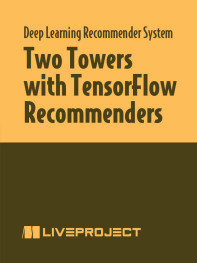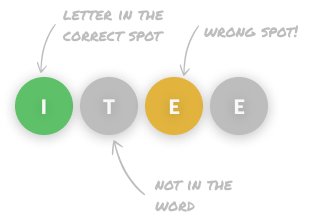Real-World Deep Learning Recommender System you own this product
- prerequisites
- basics of linear algebra • intermediate Python data science libraries • intermediate machine learning • intermediate recommender system experience (specifically Two Towers) • basics of developing an ML pipeline • intermediate TensorFlow 2.x
- skills learned
- implement and train a recommendation system • split a single recommendation system into two essential parts (retrieval and ranking) • understand what Feature Stores are and how to use them • use exploration methods to improve recommendations
pro $24.99 per month
- access to all Manning books, MEAPs, liveVideos, liveProjects, and audiobooks!
- choose one free eBook per month to keep
- exclusive 50% discount on all purchases
lite $19.99 per month
- access to all Manning books, including MEAPs!
team
5, 10 or 20 seats+ for your team - learn more

Bridge the gap between the recommender system theory you’ve learned and the hands-on experience you need. This liveProject series provides a deep dive into real-world data management in industrial applications that’s truly rare in learning resources. Developing real-world recommendation systems is much more than understanding how to connect neurons in a neural network and knowing different types of architectures. The true complexity of these systems lies in understanding how to design them to fit real-time use on industry servers, taking into account ranking of items, splitting to offline and online parts, and, most importantly, performing exploration. The advanced, comprehensive liveProjects in this series will provide data scientists with insights—usually learned on the job!—that will take their careers to the next level.
here's what's included

In this liveProject, you’ll design a movie recommendation system step by step, from initial development all the way to a production-ready system. You’ll begin with preparing the data, then you’ll analyze the data, and finally, you’ll preprocess and export it. Along the way, you’ll gain a firm understanding of the data and your users, which is key for developing a system that makes appropriate recommendations. While this liveProject doesn’t contain any machine learning, going through these steps will prepare you for feature engineering and hyperparameter tuning later on.

Once you’ve handled the data, the real magic can begin! In this liveProject, you’ll implement a basic recommendation system using the TensorFlow Recommenders framework—designed specifically for this purpose. First, you’ll calculate four baselines that your future models will have to beat. Next, you’ll learn the basics of developing a model using TensorFlow Recommenders, then design a simple, two-feature Two Towers model. Lastly, you’ll enhance this simple model by adding all the features you created in the previous liveProject while maintaining model performance that beats your four established baselines.

Behind the scenes on websites like Amazon, Netflix, and Spotify, models make predictions on thousands of items every day. Then, based on what they’ve learned, they choose only the best recommendations to display for every individual user. In the real world, performing thousands of predictions one by one, as in a notebook-only model, would be highly inefficient. In this liveProject, you’ll reconfigure the models you implemented in the previous project to accept a list of items for each user and then evaluate all items at once—choosing the best recommendations much more quickly and efficiently.

Real-world recommendation systems work with millions of users and billions of items. To handle this massive scale, recommendation systems tend to be divided into two types of models (retrieval and ranking), running one after the other, narrowing down the set of items each time. In this liveProject, you’ll implement a retrieval model using TensorFlow Recommenders, combine it with a ranking model, then create a fully functional pipeline going through both models, using a Feature Store. Finally, you’ll explore the scenario where you can’t (or choose not to) run both retrieval and ranking models online in real-time, leveraging the Feature Store once more to use the retrieval model offline.

Since recommender systems train and learn over the data they recommended themselves, they will never train over, learn, or recommend items that they didn’t already recommend for some reason, such as insufficient ranking to be seen by the user. It’s important to break this Feedback Loop in order to ensure that suitable recommendations aren’t missed. But you must strike a balance between deviating (just enough) from the system’s predictions through exploration and not defeating the system’s purpose altogether. In this liveProject, you’ll learn three methods of exploration that help you provide better recommendations to your users, as well as the costs and benefits of each.

choose your plan
team
- five seats for your team
- access to all Manning books, MEAPs, liveVideos, liveProjects, and audiobooks!
- choose another free product every time you renew
- choose twelve free products per year
- exclusive 50% discount on all purchases
-
![]() Real-World Deep Learning Recommender System project for free
Real-World Deep Learning Recommender System project for free
Prerequisites
This liveProject series is for data scientists with theoretical knowledge of machine learning, deep learning, and recommender systems who want to take the next step in their career. To begin these liveProjects you will need to be familiar with the following:
TOOLS
- Intermediate Python (NumPy, pandas, Matplotlib)
- Intermediate scikit-learn
- Intermediate TensorFlow 2.x (Keras interface)
- Basic linear algebra (vectors, spaces, matrix transformations)
- Intermediate data science
- Intermediate machine learning, including deep learning
you will learn
In this liveProject series, you’ll learn to develop a real-world recommendation system:
- Parse and engineer features using Python built-in libraries and external ones
- Use NLP to prepare the data and design features’ vocabularies for future embeddings
- Discover useful baselines, compute them and set the minimum requirements to any future model
- Implement and train an entire recommendation system using the TensorFlow Recommenders framework
- Reconfigure a “notebook-only” recommendation system to a model capable of quickly and efficiently handling many items per user
- Use linear algebra to combine networks with differing dimensionality
- Split a single recommendation system into two essential parts, retrieval and ranking, using TensorFlow Recommenders
- Understand what Feature Stores are and how to use them
- Use sampling techniques as exploration methods after model predictions have been made
- Using a Feature Store as part of a prediction pipeline
 features
features
- Self-paced
- You choose the schedule and decide how much time to invest as you build your project.
- Project roadmap
- Each project is divided into several achievable steps.
- Get Help
- While within the liveProject platform, get help from other participants and our expert mentors.
- Compare with others
- For each step, compare your deliverable to the solutions by the author and other participants.
- book resources
- Get full access to select books for 90 days. Permanent access to excerpts from Manning products are also included, as well as references to other resources.
 Real-World Deep Learning Recommender System project for free
Real-World Deep Learning Recommender System project for free
